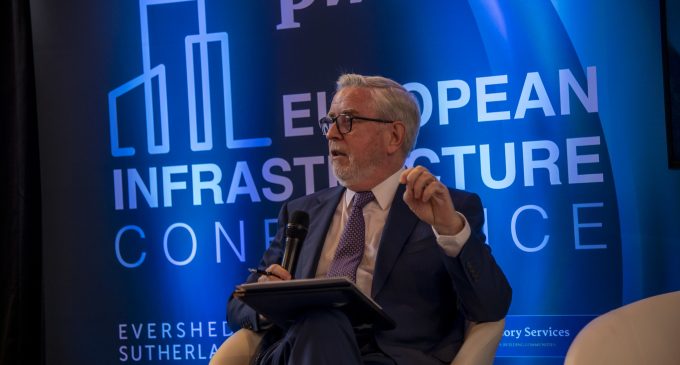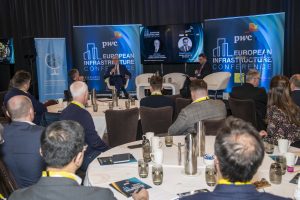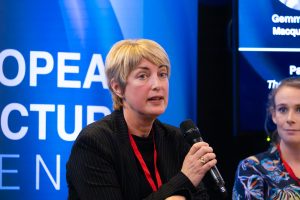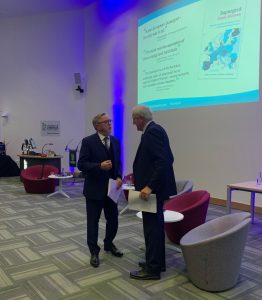Decarbonisation is Ireland’s call

The decarbonisation of infrastructure and the built environment is a global challenge and an opportunity for Ireland as has been demonstrated by CRH, EcoCem, Kingspan, and Eddie O’Connor, writes David Keniry.
CRH announced this week a strategic agreement to develop and deploy electric off-road vehicles and charging solutions with Caterpillar, the world’s leading manufacturer of construction and mining equipment, off-highway diesel and natural gas engines,  industrial gas turbines and diesel-electric locomotives.
industrial gas turbines and diesel-electric locomotives.
The agreement is focused on accelerating the deployment of Caterpillar’s 70 to 100-ton-class battery electric off-road truck with CRH testing and validating the units at its operations in North America.
CRH is the number one aggregates producer in North America and the first company in the building materials industry to sign an electrification agreement with Caterpillar.
The collaboration will advance the use of sustainable equipment in CRH’s operations and provide valuable real-world insights to Caterpillar in areas including safety, performance, operational and compliance requirements for the aggregates industry.
Vehicle electrification has an important role to play in decarbonising CRH’s business and delivering its industry-leading target to reduce absolute carbon emissions by 30% by 2030 and to become a net-zero business by 2050.
Through this partnership with Caterpillar, CRH is building on existing collaborations with Shell and Volvo to support the development of new transport technologies and innovations, driving forward the use of sustainable equipment in building materials.
CRH is the leading global diversified building materials business in the world and Ireland’s biggest company. However, it is not the only Irish company whose building materials solutions are receiving global attention.
“After water, concrete is the most used substance on earth—but it’s also a source of massive carbon emissions. Fortunately, companies like Ecocem Global are innovating low-carbon products for the construction industry that can reduce carbon emissions by about 4 billion tons of CO2 each year.” – Bill Gates.
This endorsement this week on Linkedin by the Microsoft founder of Dublin-headquartered Ecocem, a leading provider of low-carbon cement technology solutions which he has invested in, represents the global scale and significance of the solutions the Irish company is providing for decarbonising the delivery of infrastructure and the built environment.
At the European Infrastructure Conference last November Ecocem chair Pat Cox spoke about how the construction and building sector accounts for up to 50% of global CO2 emissions taking account of embedded CO2 in key inputs such as steel and concrete, and including the transport of materials and on-site emissions and that the design, construction, and maintenance of infrastructure projects need to undergo significant transformation as does public policy to meet this objective.
The central bearing of decarbonisation in design, construction, and maintenance an d how it will play a key role in how projects are procured emerged as a key takeaway in discussions throughout the conference in Dublin and was demonstrated by the recent publication of the Irish Government’s Sustainable Public Procurement reference.
d how it will play a key role in how projects are procured emerged as a key takeaway in discussions throughout the conference in Dublin and was demonstrated by the recent publication of the Irish Government’s Sustainable Public Procurement reference.
At the European Infrastructure Conference Siobhan O’Dwyer, Global Head of Marketing and Public Affairs for Kingspan Group, spoke to the investments the building materials solutions giant was making globally in its operations, solutions, and supply chain including substantial investments in renewable power, district heating, and green steel.
Kingspan has set itself a series of decarbonisation targets as part of its Planet Passionate 10-year sustainability programme, including a 90% reduction in Scope 1 and 2 emissions, and a 50% reduction in carbon intensity in its primary supply chain, by 2030 when compared with a 2020 baseline. Last week Kingspan Group completed the acquisition of a majority stake in Germany’s Steico, the world leader in natural insulation and wood-based building envelope products.
In 2023 Sweden’s H2 Green Steel, which pioneers new green production methods for steel manufacturing using hydrogen, announced that it has secured more than one million tonnes worth of orders, with a sizable proportion coming from its early-stage investor and partner Kingspan.
H2 Green Steel aims to produce steel in 2025 with 95% less carbon than comparable steel today with the world’s first large-scale green steel plant in and Europe’s first giga-scale electrolyzer. Using only H2 Green Steel products in the future could see Kingspan reduce the embodied carbon in its insulated panel products by over 45%. It would also make a substantial contribution towards Kingspan’s Planet Passionate goals by delivering up to a 35% reduction in the Group’s scope 3 emissions.
Kingspan was one of the first companies to make a long-term commitment to H2 Green Steel, which has raised €5 billion and is considered a global milestone in project finance. This commercial milestone also marks the start of the green steel revolution and has already catalysed the industry to invest in developing low-carbon steel products.
The green steel revolution has also catalysed major infrastructure investments in northern Sweden and will impact how projects are delivered across Europe. This was noted by Cox who has visited Norrbotten on several occasions in his capacity as the EU’s European Coordinator for the TEN-T Scandinavian-Mediterranean Corridor as the green steel revolution has resulted in substantial public and private infrastructure investments as the region gears up to export what will be a highly sought-after commodity.
Cox also spoke about the related issue of delivering a grid fit for Europe. The former President of the European Parliament is chair of Gore Street Energy Storage Fund established by Dubliner Alex O’Cinneide, and a director of SuperNode Ltd a cutting-edge global technology development company based in Dublin that designs superconducting connection systems to connect renewable generation and increase grid interconnection in mature markets founded by the late, great Eddie O’Connor.
In Supergrid Supe r Solution, Eddie O’Connor’s book published in 2023 on the key to solving the energy crisis and decarbonising Europe, the Airtricity and Mainstream Renewable Power founder stated “If steel were a country, it would be the fifth largest producer of carbon emission in the world! In fact, between 7% and 9% of all fossil-based emissions are derived
r Solution, Eddie O’Connor’s book published in 2023 on the key to solving the energy crisis and decarbonising Europe, the Airtricity and Mainstream Renewable Power founder stated “If steel were a country, it would be the fifth largest producer of carbon emission in the world! In fact, between 7% and 9% of all fossil-based emissions are derived
from the steel industry.”
He added: “If the annual production of CO2, from steelmaking amounts to 3.3 billion tonnes, the oxygen content of this amounts to 2.4 billion tonnes. If this oxygen were to be removed from the iron ore using hydrogen, then some 300 million tonnes of hydrogen would be necessary to achieve this purpose. To put this in perspective, this is 300,000X 15MW wind turbines generating electricity only to supply the steel industry.”
O’Connor noted that the emergence of green steel in Sweden with steelmaker SSAN and Vattenfall aiming for the first commercially competitive fossil-free steel in 2026. “Hydrogen is a vital component of the global decarbonisation drive in a host of chemical industries, both as a feedstock and energy supplier. It has a role to play in steelmaking, glass making, cement making and possibly in long-range shipping.” He concluded on the basis of cost; “electricity will power every other energy-needing process. For most transport and heating needs, electricity is the cheaper solution.”
Whether it is through electricity or alternative fuels the decarbonisation of infrastructure and the built environment will require an abundant supply of renewable power, and global leading expertise in building materials solutions. Both are available to be harnessed in Ireland.







